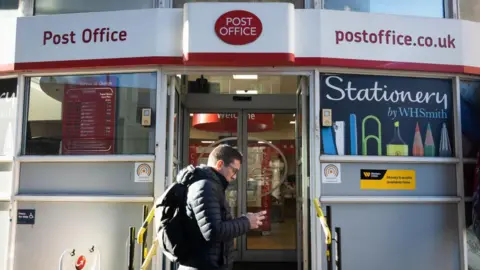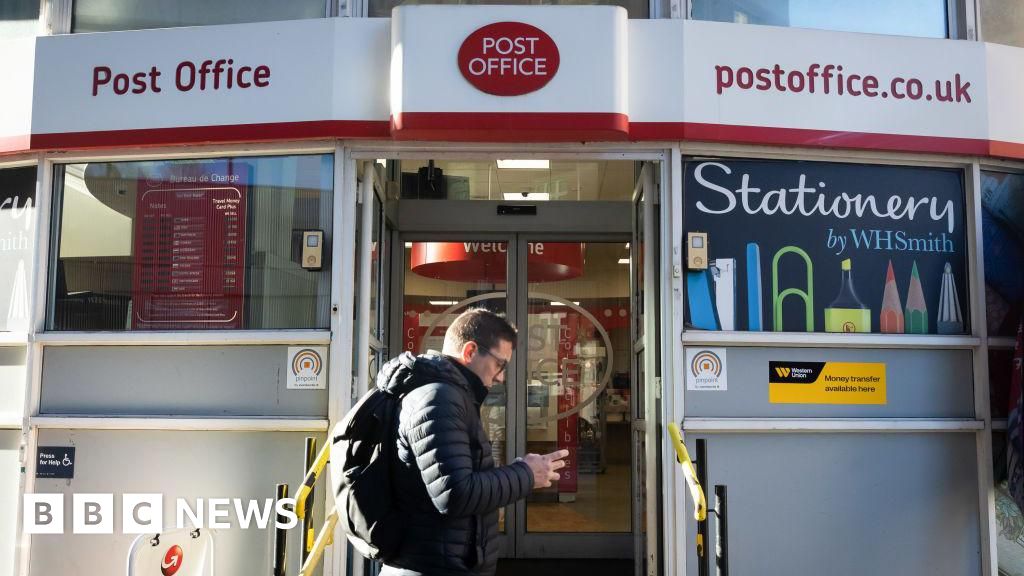 Getty Images
Getty ImagesUp to 115 Post Office branches and hundreds of head office jobs are at risk as part of a radical shake-up of the business.
The Post Office is looking at options for its wholly-owned branches, which currently employ about 1,000 workers and are loss-making.
These could include alternative franchise arrangements where an operator like the retailer WHSmith or another third party could take on the branches.
The Communication Workers Union (CWU) said that for the company to propose the plans as the inquiry into the Horizon IT scandal continues was “immoral” and “tone deaf”.
The government-owned Post Office has 11,500 branches across the UK, most of which are franchises, with 115 Crown Post Offices.
These are usually found in city centres, and staffed by Post Office employees.
The strategic review, led by the Post Office’s new chairman Nigel Railton, is designed, however, to overhaul how the organisation operates.
It faces a host of challenges, such as stiff competition from rival parcel operators like Evri and fewer people sending letters, with revenues for its branches being hit as a result.
The shake-up aims to put the business on a firmer financial footing, but it comes as the long-running inquiry into the Horizon IT scandal heads into its final stages.
Between 1999 and 2015, hundreds of sub-postmasters were wrongly prosecuted after faulty computer software made it appear as though money was missing from their accounts.
‘A new deal’
The former boss of Camelot, Mr Railton, told sub-postmasters on Wednesday that the Post Office “urgently” needed “a fresh start”, with a “new deal” putting them at the “heart of this business”.
It has become increasingly reliant on government subsidy and the retail side of its business, reporting pre-tax losses of £81m in 2022-23.
Today, nearly half of its branches are not profitable or only make a small profit from the Post Office element of the business.
It has faced a “tough” time in the last 10 years, Mr Railton acknowledged, which meant that sub-postmasters’ remuneration has “lagged behind”.
He said that the plans set out would provide more than £250m each year to postmasters by 2030, although this would be subject to government funding.
It also aims to improve branches’ banking offer for customers, and will see a “lower-risk, better value” IT system introduced for sub-postmasters.
On Monday, the European boss of Fujitsu, the company which developed the faulty Horizon system, admitted he “does not know” if the software is currently reliable.
A survey in September revealed almost seven in 10 sub-postmasters have experienced an “unexplained discrepancy” on the Horizon system since January 2020.
‘Learned no lessons’
Dave Ward, general secretary of the CWU, said it appeared the Post Office had “learned no lessons from its chaotic and uncoordinated mistakes from the past”.
“CWU members are victims of the Horizon scandal – and for them to now fear for their jobs ahead of Christmas is yet another cruel attack,” he added.
Earlier this month, Post Office minister Gareth Thomas said the organisation was at a critical juncture and the government had already commissioned its own review into what the Post Office should look like in the future.
As part of the overhaul, hundreds of jobs at its head office are also under threat, with Mr Railton saying it was necessary to “right-size” the organisation.
Mr Railton said that conversations with the government on the proposed changes, and funding required, had been “positive” so far.
Speaking in front of the inquiry on Monday, Business Secretary Jonathan Reynolds hinted that Post Office branches could fill a gap left on British High Streets by sweeping bank closures.
But with the rise of mobile banking and contactless payments, there is a question mark over whether this would be a sustainable strategy.
Separately, ministers have been exploring plans to hand ownership of the Post Office to sub-postmasters.
Reynolds told the inquiry there was still “tremendous affection” for the Post Office among the UK public and a “desire for it to have a strong future.”
A spokesperson for the Department for Business and Trade said: “The government is in active discussion with Nigel Railton on his plans to put postmasters at the centre of the organisation and strengthen the post office network for its long-term future.”

